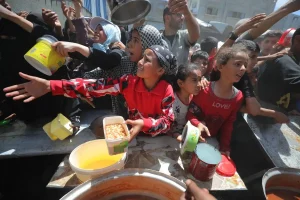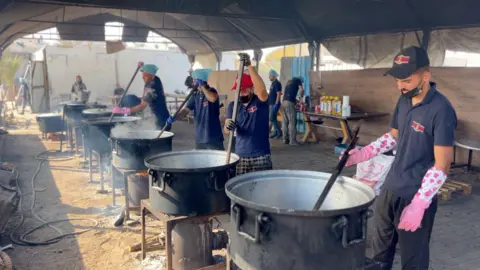Gaza’s Community Kitchens on the Brink: Aid Blockade Pushes Thousands Toward Starvation

After two months of an intensified Israeli blockade, Gaza’s community kitchens—once a lifeline for hundreds of thousands—are now on the verge of collapse. With food stocks depleted and aid deliveries halted, humanitarian organizations warn that a full-scale famine is imminent in the besieged enclave.
A Lifeline Fraying
Since the blockade’s escalation in early March, the World Food Programme (WFP) and other aid agencies have reported that their food stocks in Gaza have run out. Community kitchens, which have been the primary source of sustenance for many, are struggling to continue operations. The WFP announced on April 25 that it had delivered its last remaining supplies to kitchens preparing hot meals in Gaza; the meals were expected to be gone within days.
These kitchens had been the only consistent source of food assistance in recent weeks, although they reached only half of the population with one quarter of their daily food requirements.
Humanitarian Crisis Deepens
The blockade has led to severe shortages of food, water, and medicine, with over 3,000 aid trucks stranded at Gaza’s border and 1 million children at risk. An UNRWA facility was recently looted by desperate civilians, a consequence of the worsening humanitarian collapse.
The United Nations has urged Israel to lift its blockade of humanitarian aid to Gaza, labeling it “cruel collective punishment.” The blockade was reimposed after the collapse of a ceasefire in March, amid renewed Israeli military operations to pressure Hamas into releasing hostages taken during the October 2023 attack, which killed approximately 1,200 people in Israel.
Personal Stories Amid the Crisis
The humanitarian crisis is not just a matter of statistics; it’s a daily struggle for survival for Gaza’s residents. Ibtisam Ghalia, a Palestinian widow, is one such individual facing the dire consequences of the blockade. Since the blockade began two months ago, food, medicine, and fuel have been cut off, leading to critical shortages and skyrocketing prices. Ghalia’s family survives on minimal food, often eating only one or two meals a day. Her husband was killed in an Israeli drone strike while searching for food, and her children now grapple with trauma and hardship. The limited aid from NGOs is inadequate, and UN food warehouses are empty. Airstrikes remain a constant threat, and daily life is a struggle for survival.
International Response and Appeals
The international community has expressed growing concern over the humanitarian situation in Gaza. U.N. agencies report severe shortages of food, water, and medicine, with over 3,000 aid trucks stranded at Gaza’s border and 1 million children at risk. An UNRWA facility was recently looted by desperate civilians, a consequence of the worsening humanitarian collapse
The United Nations has urged Israel to lift its blockade of humanitarian aid to Gaza, labeling it “cruel collective punishment.” The blockade was reimposed after the collapse of a ceasefire in March, amid renewed Israeli military operations to pressure Hamas into releasing hostages taken during the October 2023 attack, which killed approximately 1,200 people in Israel,
Conclusion
As Gaza’s community kitchens face closure and the population teeters on the brink of famine, urgent action is required to alleviate the humanitarian crisis. The international community must intensify efforts to ensure the delivery of essential aid and work towards a sustainable resolution to the conflict.

